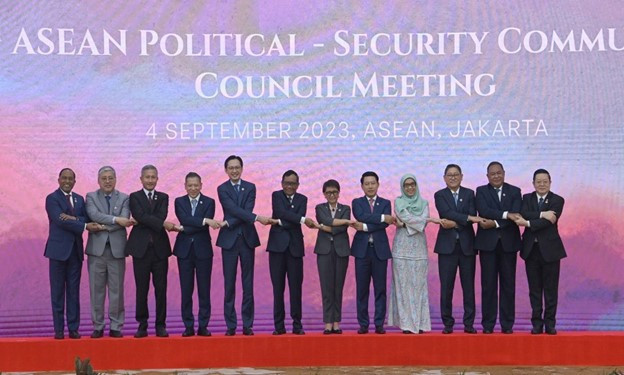Popular Reads
Top Results
Can't find what you're looking for?
View all search resultsPopular Reads
Top Results
Can't find what you're looking for?
View all search resultsASEAN Leaders Boost Security, Human Rights, and Maritime Cooperation in the Region
The implementation of ASEAN's Political and Security Pillar is still overshadowed by the Myanmar issue, geopolitical tensions and increasing rivalries, which, if left unaddressed, could escalate into open conflicts.
Change text size
Gift Premium Articles
to Anyone
A
SEAN must respond promptly to various challenges, both internal and external. The implementation of ASEAN's Political and Security Pillar is still overshadowed by the Myanmar issue, geopolitical tensions and increasing rivalries, which, if left unaddressed, could escalate into open conflicts.
This was conveyed by Coordinating Political, Legal and Security Affairs Minister Mahfud MD in his address while leading the 27th ASEAN Political Security Community (APSC) Council Meeting with foreign ministers in Jakarta on Sept. 4.
"We must not allow the same situation to occur in our region and undermine the progress ASEAN has worked for since 1967," he said.
APSC must also be capable of addressing regional challenges, especially online scam-related human trafficking and other transnational crimes.
Minister Mahfud called on ASEAN countries to strengthen regional cooperation, including border management, cross-border legal assistance and information exchange. He also encouraged the implementation of the Declaration on Trafficking in Persons in ASEAN, agreed upon at the 42nd ASEAN Summit in Labuan Bajo in May by various ASEAN sectoral bodies.
Meanwhile, Foreign Minister Retno Marsudi elaborated further and highlighted three main areas that should be the focus of APSC.
The first was addressing non-traditional security challenges.
In the past three years, the Indonesian government has handled over 2,700 cases of human trafficking involving online fraud. Interpol reports also indicate a 15 percent annual increase in cybercrime losses until 2025.
"ASEAN must adopt a more comprehensive approach to human trafficking, including resolving the long-pending ASEAN Extradition Agreement," said Foreign Minister Retno.
The second was advancing human rights in the region.
ASEAN had to continue to address evolving challenges to better protect human rights, including through inclusive dialogue.
"This is why Indonesia is pushing for the ASEAN Leaders' Declaration on ASEAN Human Rights Dialogue," minister Retno stated. Indonesia will also host the 5th ASEAN Human Rights Dialogue this year.
The third was enhancing maritime cooperation.
The Indo-Pacific region held strategic potential, she said, but the interests of major countries could threaten peace and stability in the region.
In the future, ASEAN must consistently apply international law and regional agreements as the core of regional architecture formation. This mechanism is expected to shift the paradigm from competition to collaboration.
During the meeting, ASEAN member states expressed appreciation for the implementation of the APSC Blueprint 2016-2025, which has reached 99 percent. They also emphasized the importance of nuclear-weapons-free zone treaty signing by nuclear-armed countries, human trafficking and other transnational crime prevention and respect for human rights.










